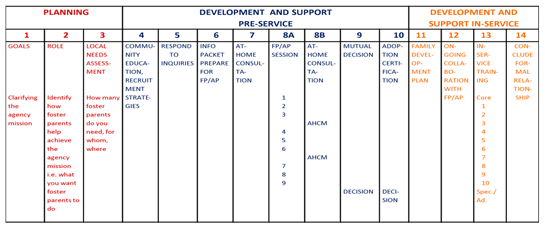RIDE’s 14-Step Model of Practice
The PRIDE Model of Practice has three major components and 14 steps or activities within those components. The model begins with clarifying the agency’s mission and the role of resource families in achieving that mission. Pre-service training is just one step, as is family assessment (home study). Agencies that choose to invest in the PRIDE Model of Practice are taught how to implement and integrate each of these steps in order to have a comprehensive, best practices approach to developing, assessing, selecting, training, and retaining resource families as partners in achieving child safety, well-being, and permanency.
PRIDE’s Competencies
Integral to the PRIDE Model of Practice is the understanding that protecting and nurturing children at risk and strengthening all their families (birth, foster, or adoptive) requires teamwork among individuals with diverse and culturally responsive knowledge and skills, but all working from a shared vision and toward a common goal. Resource parents are essential members of this team. They, like caseworkers, require preparation and training to acquire the knowledge and skills needed to be effective in their work. The aim of the competency-based approach is to assure that resource families are willing, able, and have the resources to meet the needs of traumatized children and their families to the fullest possible extent.
There are five essential competency categories for resource parents:
• Protecting and nurturing children.
• Meeting children’s developmental needs, and addressing developmental delays(which includes health, intellectual growth, self-esteem, appropriate discipline, cultural and sexual identity, social skills, academic progress, as well as ameliorating the effects of trauma and other developmental challenges).
• Supporting children’s relationships with their birth families (because whether children have a little contact, a lot of contact, or no contact with their families they have feelings about them, and best practice dictates that child welfare services promote healing between children and their families).
• Connecting children to safe, nurturing relationships intended to last a lifetime, permanency (because children need continuity, commitment, legal and social status that comes from having a family of one’s own).
• Working as a member of a professional team.
The competencies were developed from a comprehensive analysis of the roles of foster and adoptive parents. They were grouped into the five categories which had been framed by the National Commission on Family Foster Care, convened in 1991 by CWLA and the National Foster Parent Association (NFPA) and published in the book, A Blueprint for Fostering Infants, Children, and Youths in 1990s. These competencies follow a progression of learning operationalized at the pre-service (prior to child placement) and core (within the first two years of service) levels, and continue through the development of advanced and specialized skills.
One of the most compelling features of the PRIDE Model of Practice is that these competencies clarify what it is that resource parents are expected to know and be able to do for children in their care. A second compelling aspect of PRIDE is the relationship of the family assessment (home study) to these competencies. Disruptions occur when resource parents do not have the willingness, ability, or resources to fulfill one or more of these competencies.
The cornerstone of the PRIDE Model of Practice is the integration of preparation (preservice training) with the assessment of perspective resources parents to ensure that they have the willingness, ability, and resources to demonstrate these competencies. Prospective foster and adoptive parents sometimes have unrealistic ideas about what is expected of them, what the children will be like, and how the child welfare system works. But without the requisite strengths, skills, and supports, it is children who are treated like merchandise and returned to their agencies or worse, abused. Or, foster parents may be recruited, assessed, selected, and trained as full partners in child protection. But if that valuable role is not clear to all members of the agency then foster parents become frustrated when not treated with dignity and respect; they leave, the agency’s image in the community is tarnished, and the recruitment cycle begins again.
The PRIDE Model of Practice recognizes that foster and adoptive parents are a rare, valuable resource. Without them, children who must be separated from their families of origin would not have the benefits of family living. PRIDE also emphasizes the belief that to be any kind of parent (birth, foster, adoptive) is a privilege, not a right; but for a child to protected, that is a right, not a privilege.
CWLA offers training and consultation to help agencies implement the PRIDE Model of Practice, typically in one of two ways:
(1) CWLA staff come to your agency and work with all staff responsible for family foster care and adoption services. Consultation begins with administrative leadership because training is only as effective as the policy that directs it and the supervision that reinforces the skills that are learned. Training is provided for staff responsible for recruitment, family assessment (home study), pre-service training, and selection of foster and adoptive parents, and for foster parent in-service training. Foster and adoptive parents who serve as co-trainers are included. Staff who match and place children with foster and adoptive parents also are included. This is the preferred technical assistance strategy to bring the PRIDE Model of Practice to your agency, because it assures that all members of the team are working from the same values and practice base, and as role reciprocals.
(2) CWLA offers open enrollment training around the country for staff who work with foster and adoptive parents. This open enrollment is designed for agencies already using PRIDE and need to have new staff trained in the PRIDE Model of Practice. University or college-based trainers who provide PRIDE pre-service or in-service training are welcomed.

